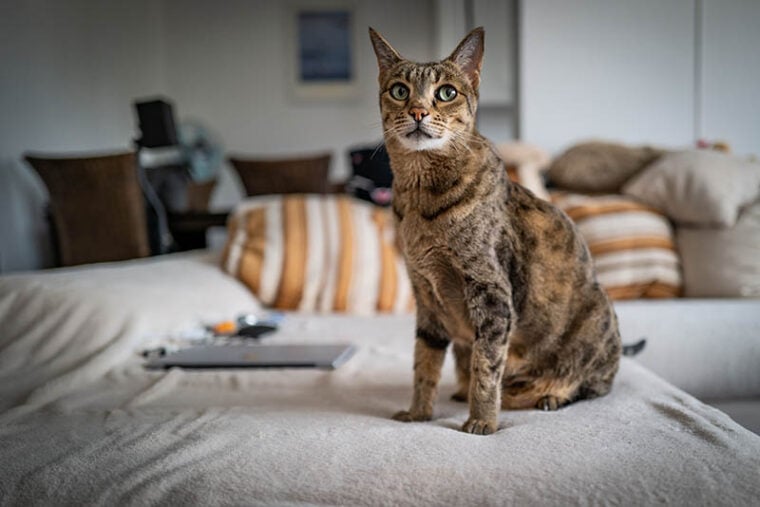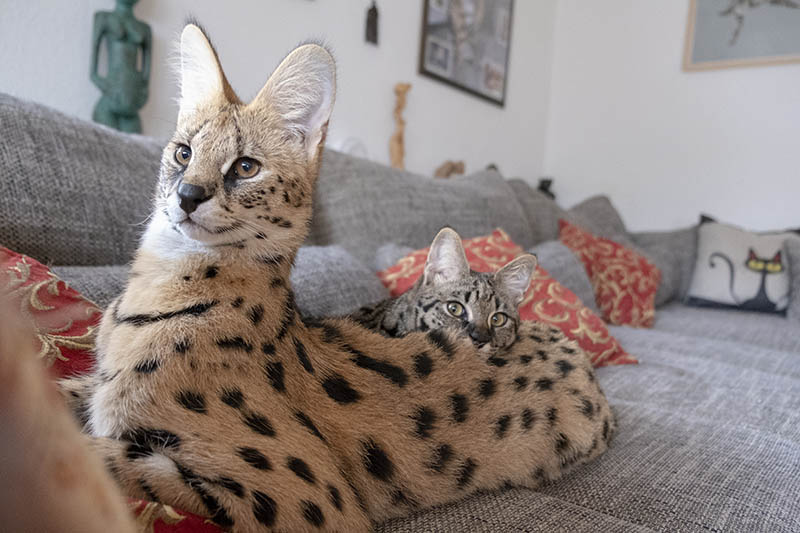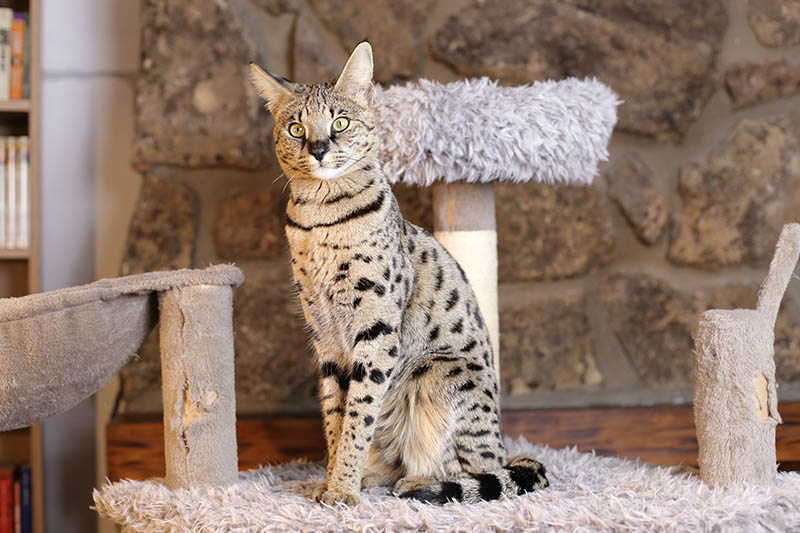
Click to Skip Ahead
The F6 Savannah Cat is gaining in popularity as an exotic pet for cat lovers across the world. This hybrid breed of cat is a cross between a wild African Serval and either a domestic housecat or one of the larger breeds, such as Bengal or Maine Coon. The result is an incredibly unique, energetic, and affectionate feline that may be the perfect furry bestie for those looking for something out of the ordinary.
With its distinctive long legs, tall ears, and spotted coat, it’s no wonder why F6 Savannah Cats are so often compared to their wild relatives. They can also exhibit some unusual behaviors that are similar to their Serval ancestors, including ‘chirping’ like birds and even jumping up onto high places with ease due to their incredible agility.
Breed Overview
Height:
10–14 inches
Weight:
8–15 pounds
Lifespan:
12–20 years
Colors:
Brown, silver, black, and smoke
Suitable for:
Active and experienced cat owners
Temperament:
Intelligent, energetic, loving, and sociable
Savannah Cats are classified into generations depending on the percentage of each parent species in their genetic makeup. The F6 generation, also known as the foundation sixth generation, is considered to be one of the most popular among owners due to their higher percentage of house cat genes. The F6 generation has the highest level of domestication compared to other generations, making them very affectionate and friendly toward people.
As they have more domestic genes than wild genes, these cats tend to behave much like regular house cats and have fewer wild instincts than their predecessors. However, they still retain some wild behavior, such as jumping high and being able to climb almost any surface with ease.
F6 Savannah Breed Characteristics
The Earliest Records of Savannah Cats in History

The Savannah Cat was introduced relatively recently and originated in the 1980s. It all started when a breeder named Judee Frank acquired a Serval male and bred it with her Siamese female. In 1986, a kitten resulted from this pairing and was named Miracle. Unfortunately, Frank had no choice but to give up Miracle, who was later designated Savannah in honor of the Serval’s previous residence. A few years after that, Savannah became pregnant after breeding with a Turkish Angora, resulting in the birth of F2 kittens.
While one kitten was born dead, two survived, and breeding continued from there. Over time, additional breeders joined in the effort to develop the lineage to what it is today. The result is the beautiful and unique F6 Savannah Cat, which retains some of its wild Serval ancestor’s features while still being loving and sociable with its owners.
Today, the Savannah Cat is recognized as a breed by several cat associations, including The International Cat Association (TICA), and has gained popularity among cat lovers worldwide.
How Savannahs Gained Popularity
In 1986, Patrick Kelly became enamored with Savannah Cats after viewing photographs of them while reading about Ocelots. Kelly subsequently became acquainted with Bill and Joyce Sroufe as well as additional ambassadors for the breed, and together they began developing breed standards. Despite this achievement, it took more than a decade until Savannahs were able to receive full accreditation.
The Eighteen was formed in 1999 by passionate breeders through a Savannah Cat breeders’ community on Yahoo. The group worked tirelessly to promote and advance the development of this breed. Savannah breeders have made great strides in promoting this cat’s unique characteristics and gaining recognition. While they share many physical traits with the wild Serval, their tame nature comes from being crossed with domesticated felines. They are known for their intelligence, friendly demeanor, and devoted following.
However, because of their wild ancestry, Savannahs are regulated by some states, requiring owners to obtain special permits or making ownership illegal in certain states.
Formal Recognition of Savannah Cats
It was a challenging journey for the Savannah Cat and its supporters to get recognized by TICA. The initial attempt by Kelly to include these cats in TICA’s New Breed Program faced a 2-year moratorium by the board, which was later extended for 2 more years, putting the program at risk. In 2000, however, the restriction was lifted, and Savannahs were granted limited registration the following year. By 2001, the breed received exhibition status. Subsequently, they were displayed at the 2002 Savannah Cat exhibition.
As a result, the breed was registered in 2006 by the Canadian Cat Association, eventually gaining Championship status from TICA in 2012. This allows Savannahs to compete alongside any other breed of cat. It is worth noting that the Cat Fanciers Association (CFA) has yet to approve this breed, as it is derived from wild cats. Despite these challenges, Savannah Cats have gained a lot of popularity and have loyal followers worldwide.

Top 3 Unique Facts About F6 Savannah Cats
1. Cats That Act Like Dogs
While this breed shares its ancestry with the wild Serval cat, it is known for its domesticated and affectionate nature. In contrast to its wild roots, F6 Savannahs have been described as having dog-like behaviors, often following their owners around and forming strong bonds with them. This loyalty, however, may also lead to wariness around strangers, making early socialization important in helping the cat become more comfortable around new people.
2. High-Energy
F6 Savannah Cats have a high level of energy that is inherited from their wild Serval ancestors. Therefore, if you’re looking for a cat that enjoys napping throughout the day, this may not be the breed for you. F6 Savannahs love playing, and they enjoy both indoor and outdoor activities. They are extremely agile and can easily jump from one ledge to another. If they don’t get enough playtime, they may make up games that could result in damage to household items. Additionally, they are intelligent and can walk on a leash, but they would rather run and play instead of walk.
3. Aquaphillic Kitties
While many cat owners assume that their feline friends are afraid of water, the Savannah Cat breaks this stereotype. These cats are known for their unique love of water, with some even seeking out opportunities for a swim. Some Savannahs are even comfortable enough to join their owners in the bath, demonstrating their remarkable affinity for water. This behavior may be attributed to their wild Serval ancestry, as Servals are known to be excellent swimmers. However, it is important to note that not all Savannah Cats enjoy the water, and each individual cat will have its own preferences and personality.

Does an F6 Savannah Cat Make a Good Pet?
F6 Savannahs make outstanding pets but require a great deal of attention and care from their owners. They are highly energetic and clever, which makes them prone to getting mischievous if they don’t receive enough stimulation, both mentally and physically. Therefore, the F6 Savannah Cat is best suited for owners who have enough time and energy to dedicate to their furry friend.
One of the distinctive traits of F6 Savannah Cats is their loyalty to their owners. They are known to follow their owners from room to room and may even try to join them in the shower. However, with proper socialization and training, they can learn to obey simple commands in order to become a well-behaved companion.
Owning an F6 Savannah Cat can be a rewarding experience, but it requires a responsible and attentive owner who is willing to provide the cat with the time, attention, and care they need. If you’re up for the challenge, a Savannah can form a deep and meaningful attachment to their owner and become a loving and loyal member of the family.
Conclusion
In conclusion, F6 Savannah Cats are a type of Savannah Cat that has been selectively bred for six generations as descendants of a feral African Serval cat. So, their Serval genes are quite diluted. These cats are highly affectionate and devoted to their owners but need to be socialized from an early age to overcome their inherent wariness of strangers.
They are energetic animals that require lots of exercise and attention from their owners. Due to their active nature, they often follow their owners at home and may try to join you in the bath as they have a fondness for water. To keep them happy and healthy, F6 Savannahs require regular playtime and mental stimulation, as well as a balanced diet and proper grooming. Overall, these unique and exotic cats can make wonderful companions for those who are willing to provide them with the care and attention they need.
Featured Image Credit: Pierre Aden, Shutterstock






